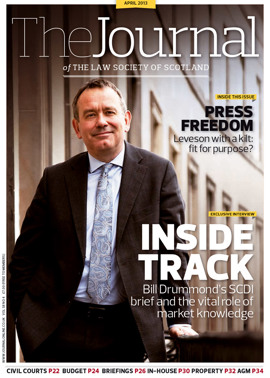Mooting comes to Strasbourg
The hallowed grounds of the European Court of Human Rights can seem a remote possibility for young would-be human rights advocates. Not so for a group of ambitious students from across Europe who attended the first ever European Human Rights Moot Court competition, held in February this year in Strasbourg. I was lucky enough to be asked to sit as a judge at the final and semi-finals of the competition, given my background as a human rights lawyer, former staffer at the Council of Europe and current legal officer at the Scottish Human Rights Commission.
The competition is jointly organised by the European Law Students’ Association (ELSA), in co-operation with the Council of Europe and is open to law students from all over Europe. It offers law students the opportunity to work on a fictitious human rights case and to play the role of lawyers for either the Government or applicant. On this occasion students were confronted with a case of forced sterilisation of a young illiterate HIV-positive woman as part of a campaign to address the spread of HIV in the fictitious state of Orosia. The case was loosely based on a real European Court of Human Rights case, and raised interesting and at times very challenging human rights issues around informed consent and the right to a private and family life/physical integrity.
The first stage of the competition saw teams drafting written submissions on behalf of either the Government or applicant, which were marked by a jury of human rights experts. The best 16 teams went to Strasbourg to compete against each other in a frenzied three days of moot courts. The final was held in the Grand Chamber of the European Court of Human Rights, between Essex University and Trinity College, Dublin. Trinity College was triumphant on this occasion. The prize? A one month traineeship at the European Court of Human Rights.
The competition offers students a great opportunity to meet likeminded peers from around Europe, and provides a space for them to discuss and exchange views on human rights issues as well as a chance to make new friends. It was very heartening to see lots of animated discussions amongst the students about the case in question. Moreover, the competition gives students a chance to fine tune and hone their legal advocacy skills. For many it was probably their first time appearing before a panel of judges and arguing the merits of a legal case.
I was really impressed by the quality of advocacy amongst the students. They were generally confident in their legal arguments, and responded well to questions from the bench. I can well imagine how nervous they must have been before a panel of nine judges (including current and former ECtHR judges) in the august surroundings of the Grand Chamber, but most participants seemed to find the experience stretching rather than overwhelming.
I would encourage any Scottish law student with a passion and interest in human rights to enter the competition. There were very few teams from the UK at the final, and even fewer from Scotland! The competition really does give students a chance to get some hands-on experience of working on human rights issues, is a great opportunity to build networks and contacts, and it’s a great plus for the CV too.
Tempted? For more information contact elsa@elsa.org, or go to their website www.elsa.org
In this issue
- Fifty shades of lay?
- Employee owners: a view from across the Pond
- All change
- EIAs: increasing the impact
- Mooting comes to Strasbourg
- Reading for pleasure
- Opinion column: Elaine Sutherland
- Book reviews
- Profile
- President's column
- Minimise the risk of rejection
- Helping with enquiries
- Path to growth
- New starts for all?
- Leveson: alarm bells
- McLeveson: still in balance
- From Gill to Bill
- A Budget for aspiration?
- Too far removed?
- Enough to send you to sleep
- Interest on damages: what rate?
- Scottish Solicitors' Discipline Tribunal
- Let's get personal
- Good hedges make good neighbours
- Sep rep: on to the rules
- Ask Ash
- Change management for lobsters
- How not to win business: a guide for professionals
- Keeping errors in check: 2
- Wills at a distance
- Law reform roundup
- Make the survey count






